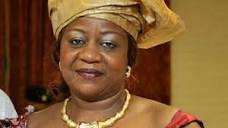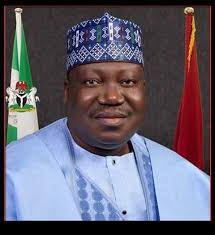***Ondo senators rejects nominee
President Muhammadu Buhari’s nominee for the position of chairman of the Niger Delta Development Commission (NDDC) Board, Lauretta Onochie was on the spot on Thursday as Senator Seriake Dickson demanded the oil producing status of her Local Government in Delta State
This was coming as the National Assembly’s Joint Committee on Niger Delta Affairs, on Thursday, commenced the screening of President Muhammadu Buhari’s Special Assistant on New Media, Lauretta Onochie, and 14 others amidst controversies

Recall that Buhari had on 25th November written the Senate, seeking her confirmation over her appointment as Chairman of NDDC and 14 other members.
Senator had interogated Onochie, to indicate her local government of origin and the community she hailed from.
Dickson indicated he wanted to know her Local Government in Delta state and her community, to ascertaon whether the community she comes from is an oil producing community or it has oil facilities located therein.
Recall that the Senate had rejected Onochie as a national commissioner for the electoral umpire, INEC over a year earlier after public outcry over her being partisan as member of the ruling party the All Progressives Congress.
Her rejection then the senate said was based on federal character principles as they observed that there was a serving commissioner from Delta State, where she hailed from.
However, in what appeared to be a ‘soft landing’ for Onochie who was being screened for the position of Chairman of the board of the NDDC this time around, the Committee did not allow her to respond to the two questions posed to her.
The acting Chairman of the Committee, Senator Bulus Amos (APC – Gombe South) said all issues concerning her nomination and other petitions against her would be discussed by the Committees at an executive session after the screening exercise.
Bulus said, “Madam nomineeyou have heard the question put to you. Just take your time. I am ready and we are all ready to discuss this during our executive session.
“So, I want to plead with all our senators here to allow her for now. We will talk during the Executive Session.”
He told members of the joint committee that all issues surrounding her nomination would be dealt with at an executive session.
Bulus had in his opening remarks said the crowd which attended the event evidenced the importance of the NDDC to people from oil producing states.
“We know that for quite sometimes the Niger Delta Development Commission has been a big place for each and everyone and everybody is desperate to follow what is happening there.
“Probably that is what has informed the large crowd outside. Everybody wants to know what we are doing here. We are doing nothing here than to screen those people that have been nominated,” he said.
In his comments shortly after the Chairman’s intervention, Senator Opeyemi Bamidele (APC – Ekiti Central) said there was need to clarify the position of the Senate at the time she was nominated for appointment as a National Commissioner of the Independent National Electoral Commission and her present nomination as head of the NDDC.
Bamidele said: “The essence of this comment is to clarify the position of the Senate on this matter.
“On the nominee for the Chairmanship position, when we had a reason to turn down the presidential nomination of this same nominee in the Senate, just because the position for which she was nominated was the position of an electoral umpire and there where members of the public who were concerned that because she is a card carrying member of a political party and a presidential aide and in the Senate committee on Electoral Matters we took into cognisance the concern of the public.
“Today in the Senate, we are faced with a different scenario. She has been nominated as a representative from an oil producing state and for the purpose of holding a political appointment for which she is eligibly qualified. That is our position and I want the public to be clear on this.”
In a similar vein, Senator James Manager (PDP -Delta South), urged Nigerians to know that Onochie’s present nomination is an “isolated case.”
Manager said: “This is one nominee we rejected on the floor of the Senate. We rarely reject nominees from the President but this was done.
“Now this person is here again before the Senate. I want the public to know that this one is an isolated case. In an executive session we will discuss it. We will look at the petitions.”
On her part, Senator representing Anambra North, Stella Oduah thanked President Buhari for nominating a woman for such a sensitive interventionist agency.
Oduah said: “Nigeria women are particularly happy that the President did what he did by appointing a female, a very capable woman, to help this wonderful and relevant agency of the Niger Delta.
“Whether we like it or not, when a woman comes in, her innate skills and her multitasking ability would be brought to bare on her job.
“I believe that for the first time Niger Deltans will have the required development that they so much are in need of. I thank Mr President for this nomination.”
On concerns whether Onochie was from an oil producing community in Delta state or not, the Chief Whip of the Senate, Senator Orji Uzor Kalu, who is a member of committee said a precedent had been set when a nominee from a non-oil producing community in the past.
Kalu said: “We need to be more guided, we have appointed a chairman from our state (Abia) that was not from the local government where they produce oil, Chief Onyema Ugochukwu, and nobody can tell us to reject this one.”
During his screening session, the Managing Director nominee of the NDDC, Dr. Samuel Ogbokwu, from Bayelsa state, said he would bridge the gap between the youths and the elderly in the region during his tenure.
He said: “I believe I’m a square peg in a square hole to man the position of the MD because I understand the problems of our people.
“I have been part of the Niger Delta struggle, I’m presently working as special assistant to the Deputy Senate President, Senator Ovie Omo-Agege.
“I will bridge the gap between the youth and the elderly. With my experience in activism and administration, I believe I’m going to bring a positive change in the Niger Delta.
“We are thankful to the President for completing the Forensic Audit of the NDDC, I believe we are going to use that as a guide to usher in a new dawn in NDDC.”
Onochie had in her opening remarks said her vision as Chairman of NDDC would be to redefine the true meaning of empowerment for the youth of the region.
He said the proposed board under her Chairmanship would work collaboratively as a team to deliver projects and empowerments to the people.
She said: “I hail from a community that produces all kinds of agricultural products that have not been properly harnessed.
“These are some of things we will work on to be able to bring food to the table of our people and to empower our people.
“Since the announcement of my nomination I have received thousands of applications from our young people wanting to be personal assistants because that is all they know.
“We are going to show them that there is more to life than being a personal assistant. We are going to show them how to be properly empowered so that our region can start booming like all the other regions.
“I have seen the men that I have been nominated along with. We have been in contact with each other. We are going to work as a team because I am a team player.”
In another twist senators Senators representing the three senatorial districts of Ondo State unanimously rejected the nomination of Mr. Charles Ogunmola as Executive
In a statement that was signed by the three senators said his nomination was not legal.
“Our position is premised on the fact that the nomination of Mr. Charles Ogunmola is non-compliance with the provisions of Section 12(1) of NDDC (Establishment etc) Act, 2000.
“The aforementioned Act clearly stated that the nominee for the position of Executive Director, Project of NDDC “shall be an indigene of oil producing area”. Mr. Charles Ogunmola is not an indigene of oil producing area of Ondo State.
“Therefore, we call on Your Excellency and the Nigerian Senate to uphold the extant Provisions of the NDDC (Establishment, etc) Act 2000 by rejecting the nomination of Mr. Charles Ogunmola.




